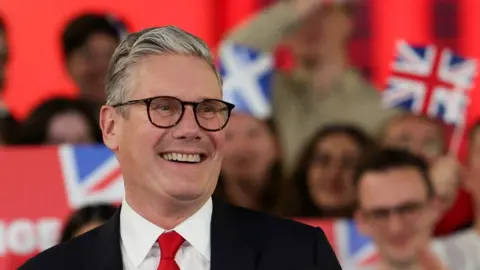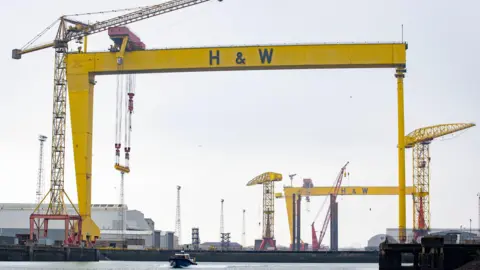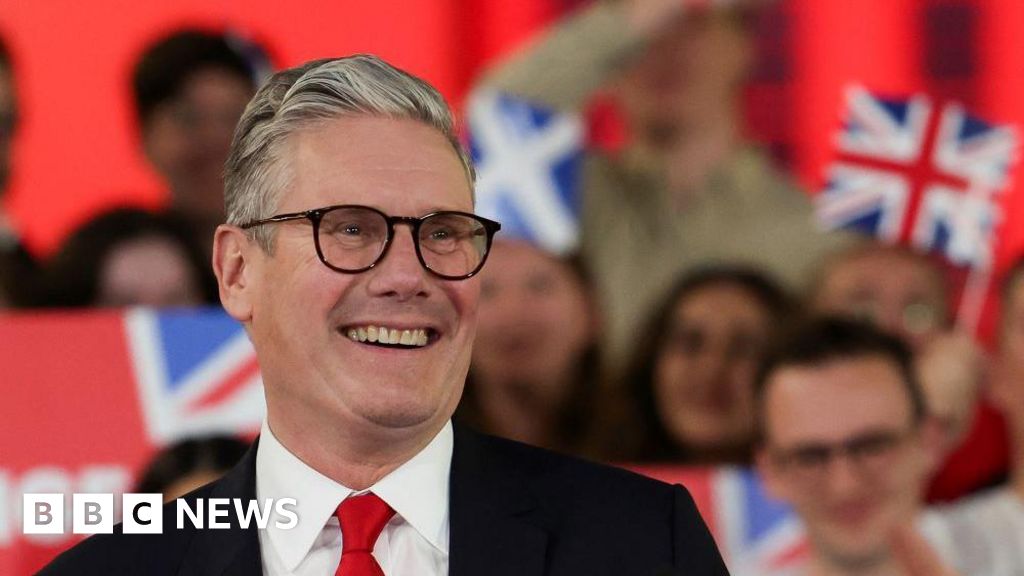By John Campbell, BBC News NI economics and business editor
 Reuters
ReutersFor the first time since 2010 the Northern Ireland Office has a Labour secretary of state.
Hilary Benn – who was Labour’s spokesperson for the role before it won the election – has taken up the post.
While there are some unknowns about how the party will approach Northern Ireland, it has already been clear about what it will do in some areas.
Will NI public services get more money?
The single most important influence on Stormont’s budget is the spending policy of the Westminster government.
Most of what Stormont spends is the ‘block grant’ which comes from Westminster.
For years the Stormont parties have complained about the negative impacts of “Tory austerity”, so they may have been hoping that Labour would open the money taps.
However the party’s manifesto contains little sign of that.
The Institute for Fiscal Studies, an independent think tank, says ‘”Labour’s additional day-to-day spending commitments are essentially trivial”.
Stormont ministers will be aiming for more progress on Northern Ireland’s overall financial relationship with the UK government.
In the dying days of the Conservative government the finance minister reached an interim deal on a new fiscal framework.
It will ensure per-person public funding in Northern Ireland reaches an objective level of need.
There will be more negotiations to come on exactly what that level should be.
But two of Labour’s big economic ideas are shaking up the planning system and more state involvement in the energy market.
Both of these areas are almost entirely devolved to Stormont.
Will Labour repeal the Troubles Legacy Act?
Labour has pledged to rip it up and start again on legacy.
The Legacy Act, which emerged from the last government’s manifesto commitment to protect Army veterans, will be “repealed and replaced”.
The act was a controversial attempt to deal with the Troubles.
It offered conditional immunity – although this was later disapplied by a court ruling – ended Troubles inquests and barred future civil actions.
It also set up the Independent Commission for Reconciliation and Information Recovery (ICRIR).
Under Sir Declan Morgan, the ICRIR was made responsible for all legacy investigations and became operational in May.
Labour has promised to scrap the act “as quickly as possible” – a move which would, for example, mean inquests returning.
There will be consultations on a new approach – the Legacy Act had practically zero buy-in.
Labour has talked of returning to “the principles” of the 2014 Stormont House Agreement, which included better supported legacy proposals.
Stormont House suggested separate investigation and information bodies.
A big question is whether the ICRIR has a future in some reshaped form, or does it go in Labour’s reset?
The legacy issue will be high on the new Northern Ireland secretary’s to-do list, with the ICRIR in limbo and PSNI troubles investigations halted by the existing act.
Will there be changes to the Irish Sea border?
The new government will continue to implement the Windsor Framework, the Northern Ireland Brexit deal agreed by the UK and EU in 2023.
In a BBC interview during the election campaign Hilary Benn, then shadow Northern Ireland secretary, made plain that honouring that deal was essential to the broader objective of improving relations with the EU.
One of Labour’s clearest and most consistent polices is that it will seek a new agreement for agri-food products traded between the UK and EU with the aim to “eliminate most border checks created by the Tory Brexit deal”.
Such a deal could at a stroke sweep away the most obvious physical impacts of the post-Brexit Irish Sea border between Great Britain and Northern Ireland.
In simple terms, if a deal ends checks on goods moving from Calais to Dover then checks will also end from Cairnryan to Belfast.
However the most far-reaching deal would likely require an oversight role for the European Court of Justice (ECJ).
The Labour leader has in the past seemed to rule this out but during the election campaign another senior figure, Jonathan Reynolds, was more circumspect.
During a debate hosted by the Bloomberg news service he was asked directly about the ECJ and he said he didn’t want to “give away our negotiating hand” and spoke about pragmatism.
Sir Keir Starmer has in the past seemed to rule this out and during the election campaign the shadow business secretary Jonathan Reynolds, also suggested modest ambition in this area.
On 27 June, Mr Reynolds spoke about a “New Zealand-style” agri-food deal as being achievable.
That would reduce some paperwork and checks from EU-to-GB but would have little impact on GB-NI bureaucracy.
Good news for Harland and Wolff?
 PA Media
PA MediaThe new government will decide the fate of Harland and Wolff, the Belfast shipyard.
The company has applied for a £200m loan guarantee, which is essential for its financial stability.
It needs to refinance an £80m high-interest loan and take on new borrowings as it scales up its operations ahead of a major contract.
It is seeking to borrow from a consortium of UK banks but needs the government to act as guarantor – meaning if the loans were to go bad the state would step in to repay the lenders.
Shortly before the election there were reports that the Treasury was opposed to the guarantee.
It is unlikely that a Labour government would want to plunge the yard and its unionised workforce into crisis, but it may be that any offer of support comes with strings attached.
What about Casement Park?
The new Labour government will not single-handedly save the Casement Park redevelopment project in west Belfast.
The problems around rebuilding the Gaelic Atheltic Association (GAA) stadium are not its fault.
Time is short and so is the money.
The most likely option is that the new Northern Ireland secretary will discuss with other stakeholders whether – together – they can find the funding to rebuild Casement, in time to stage matches in the Euro 2028 soccer tournament.
Round-table talks are, historically, how difficulties are resolved in Northern Ireland.
All sides will need to stretch themselves, and dig deep into their pockets.
Ultimately the price-tag of £300m may be a deal-breaker.
Would Labour hold a border poll?
Advocates of a referendum on Irish unity will be less than enthused by the prospect of Sir Keir Starmer in Number 10.
He shows no sign at all of giving in to their demands. Quite the opposite.
After all, this is the man who 10 months ago told BBC News NI a referendum was “not even on the horizon”.
Not ruling one out in perpetuity but saying it wasn’t close. At all.
In 2021, when his prospects of getting the premiership were a lot poorer, he said if there was a poll he would campaign for Northern Ireland to remain.
Of course it will be a decision for the Northern Ireland Secretary.
A few months ago in the shadow brief, Hilary Benn told the BBC there was “no evidence at all” that a majority of people in Northern Ireland would vote to leave the UK.
But prime ministers come, and prime ministers go.
This is obviously not currently a priority for Labour but that may someday change.
That could depend on who eventually replaces Sir Keir, just as he replaced Jeremy Corbyn, a man with whom he disagreed on much and certainly on Northern Ireland.
What will relations between London and Dublin be like?
In Dublin, new Taoiseach (Irish Prime Minister) Simon Harris is seeing the election as a new era in relations for Dublin and Westminster.
After years of strained relations during Brexit negotiations, Mr Harris told his Fine Gael party in a private meeting on Wednesday that he was making plans to seek an early engagement with the new British government.
Speaking before the UK general election, Mr Harris said he did not want to foreshadow who would be successful but was keen to hit the ground running.
He said this was in order to forge stronger relationships between the administrations on both sides of the Irish Sea.
The election provided an “opportunity and major moment” to reset relations with the Republic of Ireland’s nearest neighbour, he said.
The taoiseach told TDs (MPs) and senators it was timely to seek “early engagement to discuss close, good relationships, between Ireland and the UK, in a post-Brexit environment”.
Mr Harris, who succeeded his party colleague Leo Varadkar to lead the country, had little experience in foreign affairs or diplomacy before taking over the role.
Likewise he had not had much experience in Northern Ireland affairs, however, he has made efforts to visit Belfast since he became taoiseach.
Mr Varadkar had become a figure of ire with some British politicians and voters during protracted Brexit negotiations and strained relations.
It is now hoped that a new administration in London will reset relationships.
Who is the new Northern Ireland secretary?
Hilary Benn is a veteran parliamentarian and has represented Leeds Central in the House of Commons since 1999.
He had been the shadow secretary of state for Northern Ireland since September 2023.
He also served in the cabinet from 2003 to 2010 under Labour Prime Ministers Tony Blair and Gordon Brown.
More recently, he served as shadow foreign secretary and chairman of the Brexit select committee.
Mr Benn is the son of former cabinet minister and veteran left-wing campaigner Tony Benn, who also servied in Labour cabinets in the 1960s and 70s.


